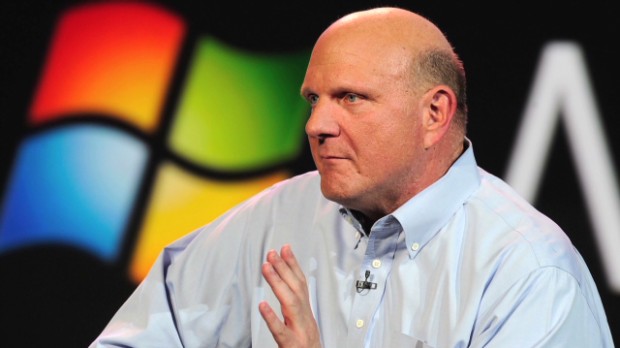NEW YORK (CNNMoney)
Microsoft CEO Steve Ballmer announced Friday that he will retire within the next 12 months.
Shares of Microsoft (MSFT, Fortune 500) soared nearly 7% on the news.
"There is never a perfect time for this type of transition, but now is
the right time," Ballmer said. "We have embarked on a new strategy with a
new organization and we have an amazing senior leadership team."
Microsoft unveiled its latest reorganization
a month ago, hoping to better align the company's organizational
structure with its new corporate strategy. Ballmer wants Microsoft to
transition to a "devices and services" company, focusing on making
hardware, online services and apps that work together seamlessly across
multiple screens and gadgets.
Ballmer said he originally had
planned to retire in the middle of the company's latest transition plan,
but he felt the company needed a longer-term CEO who would be able to
see Microsoft through its restructuring.
No successor for Ballmer was named. Bill Gates, Microsoft's founder and chairman, will be involved in the hiring process.
"I'll work closely with the other members of the board to identify a
great new CEO," said Gates. "We're fortunate to have Steve in his role
until the new CEO assumes these duties."
Investors have
criticized Ballmer for failing to groom a successor. Virtually every
Microsoft executive who was an heir apparent seemed to fly too close to
the sun and ended up retiring or being forced out. Windows Chief Steve Sinofsky and Software Chief Ray Ozzie are recent prominent examples.
Though Devices Chief Julie Larson-Green seems to be an obvious CEO
candidate, many analysts are clamoring for Microsoft to consider an
external candidate who could help the company transition away from the
PC.
Infographic: A tale of two Microsoft CEOs
Ballmer
has had a rocky tenure as CEO, a role he took over from Gates in 2000.
The company was once the most valuable in the world, but Microsoft has
lost more than half of its market value over the past decade. During
that time, the stock has failed to gain any traction, mostly wavering
between $25 and $35 a share.
Investors have been critical of Ballmer for failing to anticipate the mobile computing revolution. Microsoft trails Apple (AAPL, Fortune 500) and Google (GOOG, Fortune 500)in the world of mobile software and devices.
Its late-to-the-game attempts to get the company into the mobile arena
have largely fallen flat: Windows Phone is critically acclaimed but has
gained poor traction among consumers. The Surface tablet -- the first PC
of Microsoft's own design -- sold so poorly that Microsoft was recently
forced to take a $900 million writedown on excess Surface inventory.
Mobile is only the latest bust for Ballmer. There was the Zune,
Microsoft's ill-fated attempt to get into the once-hot MP3 game
dominated by Apple's iPod. Despite a search partnership with Yahoo (YHOO, Fortune 500), Microsoft still has been unable to generate profits from its Bing search engine and other online properties.
And of course, there was Windows Vista, a disastrously buggy PC
operating system that tarnished the company's reputation. The latest
version, Windows 8, has so for been poorly received, as consumers have
found it difficult to master the completely redesigned operating system.
But Microsoft responded to some complaints with an update, dubbed
Windows 8.1, that is expected to launch in October.



No comments:
Post a Comment